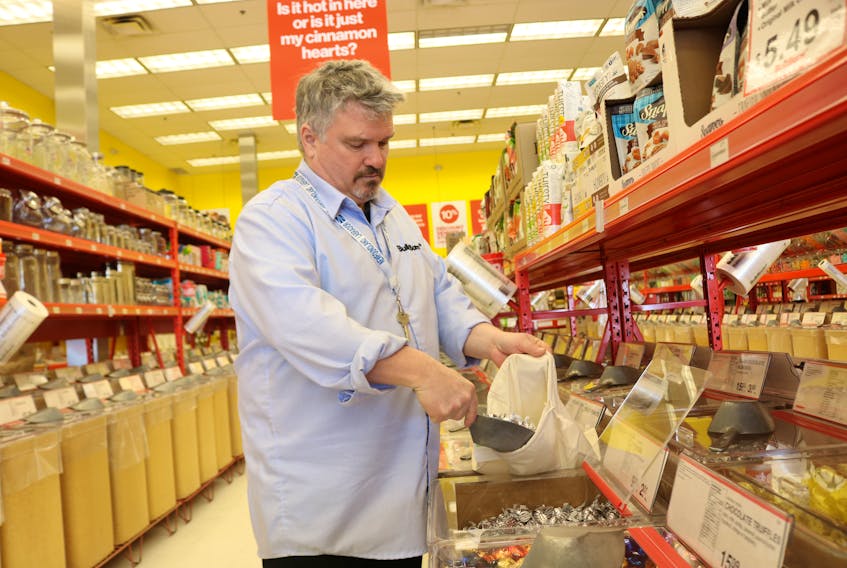SUMMERSIDE, P.E.I. - It all starts with a first step.
Using a reusable bag, switching to containers rather than snack bags, declining a plastic straw at a restaurant.
“Using containers to store foods has reached a critical mass,” said Bill McGregor, franchisee owner of Bulk Barn in Summerside. “It’s in the mainstream public.”
In June 2018, Montague-Kilmur MLA Allen Roach passed a private member’s bill in the P.E.I. legislature to prevent retailers from providing single-use plastic bags to customers.
The law is being implemented gradually, beginning with a fee of 15 cents per bag starting July 1, 2018. The fee will increase to 25 cents per bag on July 1, 2019 and, as of Jan. 1, 2020, businesses could face fines for distributing free, single-use plastic bags. As of that date, stores can only sell reusable or paper bags.
For about a year and a half, the Summerside Bulk Barn has had a handful of shoppers come in, weigh their containers, then go about their shopping.
“It was a slow start. But it’s taken hold,” McGregor said. “More and more people are changing their habits. Before it was maybe one person every two to three days coming in with their own containers, now it’s probably half-a-dozen people in a day sometimes.”
How does it work?

When a customer comes in with a container, they can approach a cashier and ask them to weigh their containers. Once they determine the weight, the container is marked and then the person can go about their shopping.
When they’re back at the register to weigh the items, the filled container is put on the scale and the weight of the empty container is subtracted to determine the weight of the product.
“But it doesn’t have to be a Bulk Barn specific container. (It could be) any container designed to hold food, so a margarine dish or a yogurt container will work,” said McGregor.
Popular items
If a shopper doesn’t have a reusable container, there are a number of options they can pick from, including plastic tubs often used for spreads and candied fruits, glass jars and storage bags.
“The glassware we’ve got on display we just got in … but they’ve been selling really well. We’ve also got these beeswax wraps that, if washed and stored correctly, can last up to a year,” said Gail McGregor, manager of the store and Bill’s wife.
There are also lined storage bags, ranging in size, that can hold sandwiches, beans, or spaghetti noodles, as well as cloth sacks that can store grains, rice, pastas and lentils.
Tips and Tricks to reduce waste:
- Shop smart: use reusable bags and storage containers to house items that don’t come in packaging like nuts
- Reuse before recycle: try upcycling items that would have otherwise been thrown to the side of the road
- Wear secondhand clothes as to not add to fabric waste
- Keep metal straws and reusable water bottles handy
- Ditch tissues and paper towels for handkerchiefs and dish towels
Zero Waste
Waste reduction and zero-waste lifestyles have gained ground as recently as 2016. There are bloggers, coaches, Pinterest boards and more to help guide people in the right direction.
According to Zero Waste Canada, zero waste is defined as designing and managing products and processes to avoid and eliminate the amount of waste and materials generated.
Zero Waste Canada is a non-profit grassroots organization.

Changing mentality
“The zero-waste concept is growing,” said Bill McGregor. “People are trying to come as close as they can to it. Now reducing waste is a way of thinking. This is just a start. As you make it a daily habit, it just becomes easier.”
He said some people, usually “older folks” have come into the store with a container that held baking powder or peanuts. In return, they’d go find that product in the store to refill the container.
“It just makes sense to them.”
McGregor is excited about the changing culture around waste production.
“If people can get past the idea of ‘what I can do is so little,’ and look at serious reduction in our single-use items, then everybody’s little bit will turn into something significant.”
Twitter.com/JPMillicentMcK
Instagram.com/JPMillicentMcK
RELATED









